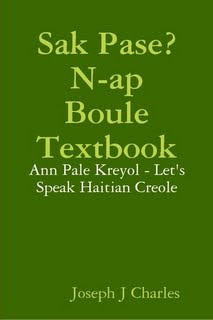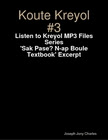This is just a sample of the excerpt from the textbook, "Quick Haitian Creole Grammar Reference: Ann Pale Kreyol Chak Jou - Let's Learn Haitian Creole Every Day" which can be found right on Amazon Kindleand Barnes and Noble Nook Book.
The excerpt is from pages 180-186
Find the rest of this episode on http://newwaveselfpublishing.blogspot.com, http://newwavepublishing.blogspot.com,http://kreyolpalekreyolkonprann.blogspot.com, and http://childrenscreolebooks.blogspot.com
Addendum #2: Dyalòg ak Vokabulè
Dyalòg ak Vokabulè
Toma ak Titonton rankontre – Toma and Titonton met
Toma: Bonjou, Titonton. Ki jan ou ye jodi-a? (Hello, Titonton. How are you today ?)
Titonton: M’ byen. E ou menm? Ban-m nouvèl papa ou ? (I’m fine. And you ? How is your father?)
Toma : M byen wi. Papa-m pa gaya (I am fine. My father is not well. He is ill)
Titonton: Ki jan Marimat ye? Eske l’ap demele-l? (How is Marimat? Is she getting along?)
Toma: Marimat byen wi. L’ap kenbe (Marimat is fine. She is getting along)
Titonton: Sa fè lontan nou pa wè. S’ak pase ? (We have not seen each other for a long time. What’s up?
Toma: Monchè, m’ap boule (my dear, I am managing)
Titonton: Bon, monchè, ban-m nouvèl mennaj ou a ? (Okay, dear, how about your girlfriend ? )
Toma : Nou te kraze sa (We had a breakup or we broke up)
Titonton: Depi kilè ou pa ansanm avèk li ? (How long have you not been with her ?)
Toma: Ou enterese nan li? (Are you interested in her?)
Titonton: M pa menm konn non-l, non. Ki jan’ l rele ankò? (I do not even know her name. What’s her name?)
Toma: Li rele Jaklin. (Her name is Jaklin)
Titonton: An Kreyòl, se Jaklin. An fransè, se Jacqueline. (In Creole, it’s Jaklin. In French, it’s Jacqueline)
Toma : Monchè, kite-m kraze rak / Kite-m ale ! (my dear friend, let me take leave of you. Let me go!”
Titonton: Oke Toma. N’a wè mwa pwochen si Bon Dye vle. (See you next month, God willing !)
Toma: Oke. N’a wè nan inivèsite-a (Right. See you at the university).
Additional Haitian Creole Expressions and Explanations:
M’ap kenbe – I’m getting along
M’ap boule – I am managing
Mwen la / m la – I’m okay
M pa pi mal - I am no worse
M byen – I am fine
Wi – yes
Non – no
Explanations of Wi and Non in a sentence:
Use “Wi – yes” with positive declaration sentences. Non is used with negative declarative sentences.
Exercises – Egzèsis:
Ki sa? What ? Sa ? what?
Ki sa sa-a ye? What is this ?
Sa ou pral fè lavil? (What are you going to do downtown ?)
Sa ou ap chache la-a? (What are you looking for here ?)
Sa ou bezwen? Sa w bezwen? Ki sa ou bezwen? (What do you need ?)
Ki sa ou fè lè ou malad ? What do you do when you get sick ?
M-al nan dispansè-a / I go to the healthy station.
Repete – Repeat
Ki sa sa-a ye?
Se yon zeguy – It is a needle
Ki sa sa-a ye?
Se yon mato – It is a hammer
Eske gen yon tibokit sou sab la? Is there a pale on the sand ?
Ki kote? Kote? Ki bò? Where?
Ki kote ou travay? Where?
Ki kote ou ap travay? Ki bò ou ap travay ? Where are you working ?
M’ap travay nan izin nan – I am working in the factory
Ki kote ou prale? – Where are you going?
M pral legliz (church)
M pral nan mache (market)
M pral Pòtoprens (Port-au-Prince
M pral anba lavil (downtown)
M pral lapòs (Post office)
M pral lekòl (school)
M pral danse nan rara (popular music and dance)
M pral nan kanaval (carnival)
M pral Fòlibète – I am going to Fort Liberté
M pral Kap Ayisyen. Kap Ayisyen nan nò peyi dayiti
Ki kote lèkay ye? Lèkay nan sid peyi a
Ki kote Jakmèl ye?
Ki kote Gonayiv ye?
Ki bò Jeremi ye?
Ki sa ou pral fè lavil ?
M pral voye yon lèt ak yon kasèt bay manman-m k’ap viv Nouyòk ( I am going to send a letter and a casette tape to my mother who is living in New York)
M pran nan mache Fè pou-m sa achte materyèl lekòl pou timoun yo (I am going to the Iron Market to buy school supplies for the kids)
Nòt Kreyol: Translation of the Preposition “To” indicating motion to a place:
Kreyòl uses “Nan” before the noun indicating the place to express motion to a place. Also, keep in mind that nouns that refer to specified, unique places usually do not need the definite article. For example, I am going to church – M pral legliz; I am going to school – M pral lekòl.
Ki kote konpè Jak prale? Where brother Jak going ?
Li pral travay nan jaden li - He is going to work in his garden.
Poukisa – Why?
Poukisa tout timoun sa yo ap mache yonn dèyè lòt konsa? Y-ap mache an fil endyen – Why are all these kids walking in line like this ?
Se yon pwosesyon. Gen yon mès nan legliz katolik la – It is a procession. There is a mass at the catholic church.
Pè-a pral bay lamès – The priest is going to preside over the mass
Ki moun ki / Ki moun - Who
Ki moun ki pral Kanada? Who is going to Canada?
Ki moun ou vle envite nan fèt ou a ? Whom do you want to invite to your party ?
Ki moun ki vle ede-m? Who wants to help me?
Ki moun ki konn danse ? Who knows how to dance ?
Eske ou konnen yon moun ki konn pale alman? (Do you know somebody who knows German ?)
Ki moun ki pale fransè nan legliz la ? Who speaks French in church ?
Pa gen moun ki pale fransè ak alman nan legliz la – There is nobody who speaks French and German in the church
Possessive in Creole
Whose is it? Se pou ki moun?
(Belonging to, pertaining to, indicating possession)
Bato sa-a se pou Jan. Se bato Jan.
Se rad Tipapa. Rad sa-a se pou Tipapa
Notes / Nòt: An easy way to understand and express possession in Haitian Creole is to have the noun referring to what is owned followed by the name of the owner. If a pronoun follows a noun, it is used as a possessive adjective.
Examples: Se lajan/kòb Delòm. Se kòb li – (It’s Delòm’s money. It is his money)
Se chokola Manno ak Wobè. Se chokola yo – It is Manno and Robert’s chocolate. It is their chocolate.
Se vwazin Terèz – Se vwazin li – She is Teresa’s neighbor. She is her neighbor
Se liv Joslen. Se liv li – It is Jocelyn’s book. It is his.
Se mallet Jisten. Se malèt li – It is Justin’s suitcase. It is his suitcase.
Konbyen? – How much / How many?
Konbyen rad ou wè nan chanm nan? - How many pieces of cloth do you see in the room ?
M wè yon chemiz (shirt), yon pè pantalon (pants), yon mayo (t-shirt), yon pè soulye (a pair of shoes), de pè sapat (a pair of thongs), yon kravat (tie), de jip (skirt) yon pè chosèt (socks), yon pè tenis (a pair of tennis shoes) epi yon ba (stockings)
Other forms of possession: Asking questions
Pou ki moun kay sa yo ye? Poukiyès kay sa yo ye? Whose are those houses?
Pou ki moun plim sa-a ye? Poukiyès plim sa-a ye? Whose is this pen?
Pou ki moun kreyon sa-a ye? Poukiyès kreyon sa-a ye? Whose is this pencil?
Sa yo se kay leta (kay gouvènman) – These are government houses /buidings
Pouki moun plaj sa yo ye? Poukiyès plaj sa yo ye? Se plaj prive
Whose are these beaches? They are private beaches
********************************
Eske ou gen yon bagay? Do you have anything (something)?
Non. M pa gen anyen – No, I do not have anything



























